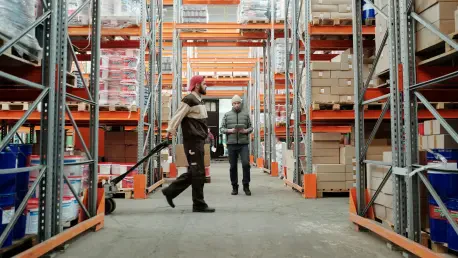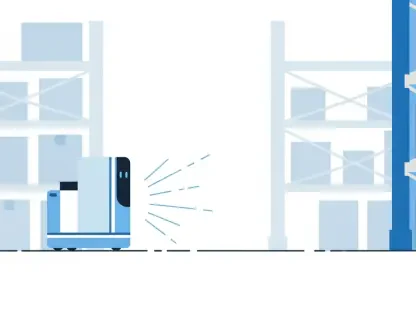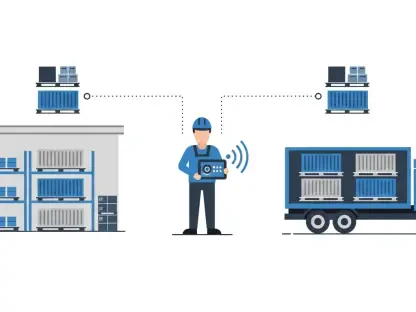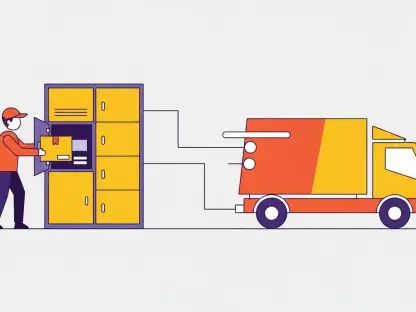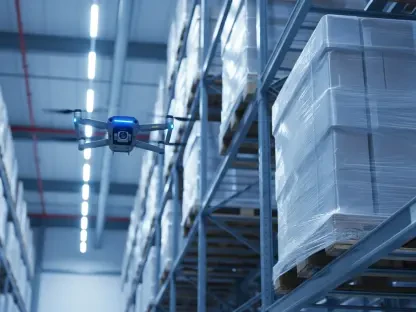Imagine a bustling warehouse where workers spend precious minutes searching for misplaced inventory, or a hospital setting where critical supplies are buried under clutter, delaying urgent care. Inefficiencies like these are more than mere inconveniences—they drain time, increase stress, and erode profitability across industries. The solution lies in rethinking how space is utilized, turning storage from a passive necessity into a dynamic driver of productivity. Tailored storage systems, designed to meet specific operational needs, are emerging as a game-changer for workplaces ranging from retail floors to sterile healthcare environments. By addressing unique spatial challenges with precision, these systems promise not just organization but a measurable uplift in workflow and safety. This exploration delves into the transformative power of customized storage, uncovering how it streamlines operations and fosters smarter, safer work environments for diverse sectors.
Unpacking the Impact of Storage on Operations
Addressing Common Workplace Challenges
Disorganization in workplaces often leads to cascading inefficiencies that ripple through daily operations. Employees waste valuable time hunting for tools or materials, while cluttered spaces heighten the risk of accidents, particularly in high-traffic areas like warehouses or retail backrooms. The financial toll of such delays can be staggering, as productivity dips and frustration mounts among staff. Tailored storage emerges as a critical antidote, offering systems that prioritize accessibility and order. By customizing shelving and bin solutions to fit specific inventory or equipment, businesses can drastically cut down on search times and minimize hazards. This approach ensures that every item has a designated place, transforming chaotic environments into streamlined hubs where focus shifts from finding to doing, ultimately enhancing overall operational flow.
Enhancing Safety and Compliance Standards
Beyond mere organization, tailored storage plays a pivotal role in upholding safety and meeting industry-specific regulations. In sectors like healthcare and catering, where hygiene is paramount, specialized stainless-steel shelving is designed to resist contamination and withstand rigorous cleaning protocols. Such solutions not only prevent cross-contamination but also align with strict compliance mandates, safeguarding both staff and clients. Meanwhile, in industrial settings, robust racking systems engineered to support heavy loads—often up to 600kg per shelf—prevent structural failures that could lead to injuries. By integrating safety-focused designs, these storage systems create environments where risks are mitigated, and adherence to standards becomes second nature. This dual focus on safety and compliance underscores how customized storage elevates workplaces beyond efficiency to a realm of accountability and care.
Innovative Solutions for Diverse Industries
Versatility in Warehousing and Retail Environments
In the fast-paced worlds of warehousing and retail, tailored storage systems are indispensable for managing high volumes of goods under tight deadlines. Industrial shelving and racking options, such as adjustable longspan and rivet systems, offer the flexibility to adapt to varying inventory sizes while maintaining durability under significant weight. These designs allow for quick assembly and reconfiguration, ensuring that space evolves with demand. For smaller components, specialized bins provide immediate visibility and access, slashing downtime spent searching for parts. This adaptability means that whether storing bulk pallets or tiny fasteners, every inch of space is maximized, enabling workers to focus on throughput rather than logistics. The result is a seamless operation where efficiency isn’t just a goal but a consistent outcome, directly impacting bottom lines.
Specialized Applications in Healthcare and Catering
Tailored storage solutions shine equally in highly regulated sectors like healthcare and catering, where precision and hygiene dictate operational success. Stainless-steel shelving, crafted to meet stringent cleanliness standards, ensures that medical supplies and food prep materials remain uncontaminated, supporting patient safety and regulatory compliance. These systems are often designed with easy-to-clean surfaces and modular setups, allowing for quick adjustments in dynamic environments like hospital wards or busy kitchens. Additionally, expert consultation services help map out space utilization in three dimensions, optimizing layouts from floor to ceiling. This meticulous planning prevents overcrowding and ensures critical items are always within reach, reducing response times in emergencies. By addressing both functional and compliance needs, customized storage transforms these specialized workplaces into models of efficiency and reliability.
Turning Spatial Constraints into Opportunities
Reflecting on the strides made by industries adopting tailored storage, it’s evident that what once were persistent challenges have become catalysts for innovation. Businesses across warehousing, healthcare, and retail tackled inefficiencies head-on, integrating robust shelving and specialized bins to reclaim lost time and space. Expert guidance in layout design proved instrumental, as companies reshaped environments to prioritize accessibility and safety. These efforts not only curbed operational delays but also fortified compliance with sector-specific standards, setting a precedent for others to follow. Moving forward, the focus should shift to scalable solutions that anticipate growth, ensuring storage systems adapt as needs evolve. Exploring partnerships with experienced providers can further refine spatial strategies, turning every workplace into a blueprint for efficiency and resilience.
